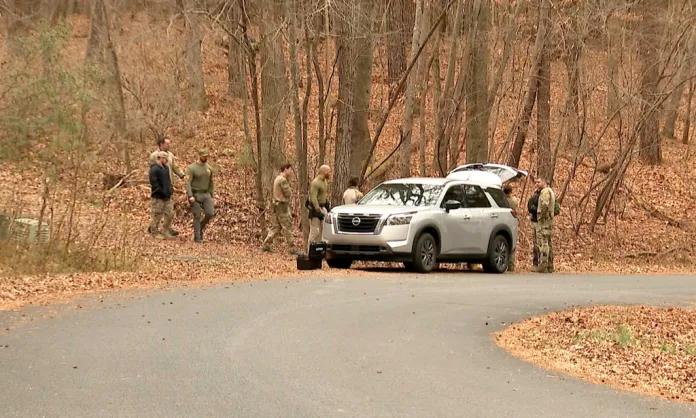As part of the Trump administration’s push to apply capital punishment “where possible,” the Justice Department is aggressively pursuing the death penalty against an alleged member of the anarchist “Zizian” cult charged with the January murder of a Border Patrol agent in Vermont.
The federal prosecution of Seattle native Teresa “Milo” Youngblut, 21, who pleaded not guilty Friday to murdering Border Patrol agent David Maland, further signals the Trump DOJ’s zero-tolerance policy for violence against federal agents amid a surge in assaults on law enforcement officers.
Under President Donald Trump’s administration, the DOJ has cast Youngblut’s case as a fitting opportunity to flex its recently revived death penalty policy, an aggressive approach to capital punishment that marks a stark reversal from former President Joe Biden’s final days in office, when dozens of federal death row inmates had their sentences commuted to life imprisonment.
Should the Trump DOJ secure a conviction and eventual execution, it would constitute one of the first instances of federal capital punishment in years, as well as in Vermont, which effectively ended the death penalty for state sentences decades ago.
A case of violent extremism
Youngblut reportedly belongs to the transgender-antifascist, or “trantifa,” cell named after alleged ringleader Jack “Ziz” LaSota. The so-called death cult is linked to six killings across the country, including the fatal shooting of Maland.
On Jan. 20, Youngblut allegedly opened fire on Maland and other officers “without warning” during an immigration inspection near the Canadian border in Coventry, Vermont.
Felix “Ophelia” Bauckholt, a fellow “Zizian” and German national traveling alongside Youngblut, was killed by returning gunfire in an ensuing shootout with responding Border Patrol personnel. Agents arrested Youngblut at the scene while Maland was fatally wounded.

Youngblut entered a not guilty plea in the high-profile murder case at a court appearance Friday, the first since federal prosecutors filed upgraded charges and said they would seek the death penalty against her.
DOJ paves a path to pursuing the death penalty against Youngblut
Half a year before the capital indictment, federal prosecutors initially lodged lesser firearms-related assault charges against Youngblut.
Per the Jan. 22 criminal complaint, Youngblut was only charged with intentional use of a deadly weapon “while forcibly assaulting, resisting, opposing, impeding, intimidating, or interfering with federal law enforcement” and discharge of a firearm during an assault with a deadly weapon.
Together, the two counts carried a minimum 30-year prison sentence and were not punishable by death.
Murder, a capital crime, was added months later to the charges, after the DOJ revived its death penalty policy and singled out Youngblut’s case as a prime example of how the Trump administration will aggressively apply capital punishment when appropriate, especially in law enforcement officer killer cases.
TRUMP PROPOSES DEATH PENALTY FOR DC MURDER CONVICTIONS
In a Feb. 5 memorandum issued shortly after being sworn in, Attorney General Pam Bondi lifted a Biden-era moratorium on federal executions in accordance with Trump’s executive order directing the DOJ to restore use of the death penalty.
Trump’s sweeping directive, signed on the day Maland died, declared that DOJ officials should seek the death penalty “regardless of other factors” against alleged police killers.
Bondi accordingly asserted that federal prosecutors are “expected” to pursue capital punishment in cases involving the murder of a law enforcement officer and cited Maland’s shooting death as one such case in which capital charges would be warranted.
“This policy applies to the recent murder of U.S. Customs and Border Patrol agent David Maland during a traffic stop in Vermont,” Bondi’s department-wide memorandum reads.
In June, the defense claimed in a court filing that federal prosecutors were fast-tracking the process for pressing death penalty charges against Youngblut.
The defense’s motion, which unsuccessfully sought to extend the deadline for persuading the attorney general’s capital case review committee against recommending the death penalty, accused the Trump administration of rushing an “unprecedentedly tight timeline” that is “vastly out of step” with DOJ procedures.
DOJ protocol concerning death penalty recommendations typically takes more than a year, Youngblut’s attorneys said.
On Aug. 14, a grand jury returned a superseding four-count indictment charging Youngblut with Maland’s murder, among other offenses, thereby elevating the case to death-eligible.

That day, at Bondi’s direction, acting U.S. Attorney for the District of Vermont Michael Drescher submitted a notice to the court announcing that prosecutors intend to seek the death penalty against Youngblut, specifically for count four: discharge of a firearm during a violent crime resulting in death.
To justify a death sentence, the prosecution must prove elements of intent, such as intent to kill. Federal prosecutors will also attempt to prove several aggravating factors for the court to consider in determining whether a death sentence is justified, including that Youngblut targeted Maland because of his status as a public servant.
The Washington Examiner contacted Youngblut’s defense counsel for comment.
Youngblut recently acquired new legal representation. Christine Lehmann, a senior capital attorney at the Louisiana Crisis Assistance Center specializing in defending clients with mental illness and intellectual disabilities, is taking on Youngblut’s case.
Capital punishment in Vermont
The case’s setting is significant, given that capital punishment has a complex history in Vermont.
In 1972, Vermont abolished the death penalty due to the Supreme Court decision in Furman v. Georgia that struck down all existing state-level execution laws. Though other U.S. states amended their respective capital punishment statutes to conform with the Supreme Court ruling, Vermont did not reinstate the death penalty post-Furman.
Vermont technically permitted capital punishment for treason until 2024, when House Bill 878 replaced the penalty with 25 years behind bars or up to lifetime imprisonment plus a possible $50,000 fine.
TRUMP: COP KILLERS SHOULD ‘IMMEDIATELY’ GET THE DEATH PENALTY
Previously under the state statute, anyone owing allegiance to Vermont “who levies war or conspires to levy war … or adheres to the enemies thereof, giving them aid and comfort, within the State or elsewhere, shall be guilty of treason against this State and shall suffer the punishment of death.”
In 2005, Donald Fell was the last defendant sentenced to death in Vermont on federal charges for the murder of a supermarket worker, but a judge tossed out the conviction because of juror misconduct. In the lead-up to a 2018 retrial, Fell accepted a plea agreement to avoid facing death row again and was sentenced to life in prison without the possibility of parole.
